By Kenton X. Chance
CASTRIES, St. Lucia, CMC — Caribbean countries have been warned to prepare for a drier than normal hurricane season even as forecasters say the effects of the lower rainfalls will be felt in the dry season of 2016.
“Could it be like 2009-2010? Well, if it going to be any of the year from now and a couple of years from now, it is likely going to be this year,” climatologist Cèdric Van Meerbeeck of the Caribbean Institute for Meteorology and Hydrology told the Regional Climate Outlook forum for the 2015 wet/hurricane season on Monday.
The US-based National Oceanic Atmospheric Administration (NOAA) is predicting six to 11 named storms for the 2015 Atlantic hurricane season, but regional disaster officials have warned Caribbean countries not to become complacent.
“What we can expect for the wet season or the hurricane season – that means from today until the end of November — is that the temperatures are going to feel hotter than usual and that is pretty much throughout the Caribbean,” Van Meerbeeck said.
He, however, said that the discomfort level will not be as high, since there will be less humidity.
Van Meerbeeck said that with a drier than usual wet season, forecaster are already beginning to be worried about the impact on productive sector come next dry season, which traditionally runs from December to May in most part of the Caribbean.
“The dry season is our tourism season. That is when most of our water is being used not only by tourists but also extinguishing fires, also by the farmers if they want to irrigate. There are many sectors that consume water in the dry season and our water reservoirs are not recharged in the dry season, they are recharged in the wet season before that,” he said.
“So, if our wet season is going to be drier than usual, we are starting to be worried at this stage. But the advantage of knowing it already is that we can prepare, we have a longer time to prepare for that severe dry season that we probably are going to have next year,” Van Meerbeeck said.
He said the drier conditions will mean fewer showers, and wet spells, and, in total, less rainfall accumulating for much of the region, except Bahamas.
“The Bahamas behaves a bit differently when we are in a state of El Niño,” Van Meerbeeck said of the warming of the Pacific waters near the equator that affects weather condition in the Caribbean and other parts of the world.
“In El Niño, what you see is that the conditions in the atmosphere lead to less showers, less thunderstorm, less tropical showers and cyclones, in the main, the Antilles islands and in The Guianas and in Belize to a certain level, but, in The Bahamas, you get a certain effect, you get more showers. So that part will be wetter,” Van Meerbeeck said.
The two-day meeting brings together weather forecasters, disaster managers, and other officials from 25 countries and territories from across the Caribbean.
It is organised by Caribbean Institute for Meteorology and Hydrology and forms part of the Caribbean Climate Outlook Forum, which meets every year at the beginning of the dry and wet seasons.






